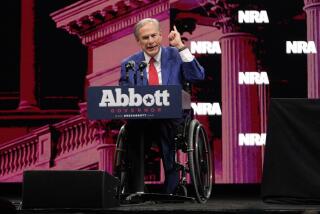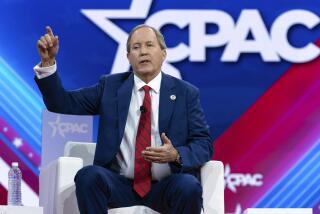Texas gay marriage: Two friends who took opposite sides in the courtroom
- Share via
HOUSTON — Mark Phariss almost didn’t file the lawsuit that led a judge to overturn the Texas ban on same-sex marriage this week.
One reason: Phariss, a Dallas corporate lawyer seeking to marry his partner of several years, has long been friends with one of the conservative state officials he sued: Texas Atty. Gen. Greg Abbott.
The two men grew up about 50 miles apart in conservative country — Phariss in Lawton, Okla., Abbott to the south in Wichita Falls, Texas. Later, they became friends during law school and stayed in touch over the years with an occasional meeting or Christmas card.
INTERACTIVE MAP: The march of gay marriage
Now, for the last several months, they have been at the opposite ends of one of the nation’s most contentious issues as it played out in the Texas courts, the battle over legalization of same-sex marriage.
A federal judge found in Phariss’ favor Wednesday, striking down the state’s ban on same sex marriage in a ruling that found the prohibition has no “legitimate governmental purpose.”
Abbott, who is running for governor, filed an appeal a day later, on Thursday.
Phariss, 54, and Abbott, 56, first met in the 1980s at Vanderbilt University law school in Nashville.
Abbott was conservative, Phariss more liberal, and at that point not yet openly gay. Abbott was a year ahead of Phariss and the two talked about school and politics.
“I don’t know that we agreed on much at all,” Phariss recalled. Still, “It never affected our friendship.”
Abbott was married at the time. Phariss met his wife Cecilia when the three went out for drinks or dinner.
“Cecilia and I were, indeed, friends with Mark Phariss. We remember Mark from our law school days and his early days as a lawyer in San Antonio,” Abbott said this week.
They remained friends after Abbott graduated and moved in 1984 to Houston, where he began studying for the bar.
One day when Abbott was out jogging after a storm, he was struck by a falling tree limb and hospitalized.
Phariss, who was clerking in Tulsa, flew down to join Abbott’s wife and mother at his bedside.
Abbott was bedridden but still upbeat, Phariss said, and seemed glad to see him.
Abbott said he and his wife “remain grateful that Mark visited the hospital during the trying time after my injury.”
The accident left Abbott paralyzed from the waist down and in a wheelchair. He went on to pass the bar and join one of Houston’s largest law firms.
“He exhibited a great deal of personal courage to overcome what happened,” Phariss said.
A year later, Abbott helped Phariss get a job offer from his law firm, although Phariss turned it down to work in San Antonio. There he met the man who would become his partner of nearly 17 years, former Air Force Major Victor Holmes, 44.
When Abbott later came to San Antonio while campaigning for a statewide judgeship, Phariss — by then a registered Democrat who occasionally voted Republican — drove him around, taking him to meet lawyers in his office.
Phariss was openly gay with friends, but not with business associates. It was never an issue with Abbott, he said: “We had a good relationship.” They still exchanged Christmas cards.
Last year, after the U.S. Supreme Court overturned the federal Defense of Marriage Act, Phariss and Holmes began weighing whether to file a lawsuit of their own to push for same-sex marriage in Texas.
Holmes had retired from the military and was working as a physician’s assistant. He had no major reservations about a lawsuit.
Phariss did.
“I had a whole slew of concerns. I was not openly out in my professional life. I’ve been the general counsel of companies. I was afraid it would hurt my career,” he said, “There’s a big difference between being out and being public.”
He thought about Abbott, who he knew would be named in the lawsuit. He wondered if his friend would take it personally, or see the lawsuit as a political ploy.
Phariss reasoned that he wouldn’t be suing Abbott personally, but rather in his capacity as attorney general.
“This wasn’t brought for any political reasons at all — this was brought for us to get our rights,” Phariss said.
Before he filed the lawsuit, Phariss talked himself into believing there wouldn’t be much news coverage.
“That was clearly wrong,” he said.
The story exploded, with newspapers across the country profiling Phariss and Holmes. Phariss was careful not to mention his friendship with Abbott. He didn’t feel ready to talk about it, especially with the lawsuit pending. The reaction was strong enough anyway.
Some friends sent him angry texts saying they were unhappy with him for pursuing the case.
“At first I thought they were joking,” Phariss said — until they stopped talking to him.
He had alerted his boss to the lawsuit. Phariss said he and others at work have been supportive, primarily concerned for his safety in such a deeply conservative state. Phariss said he has not received any threats. Instead, he and Holmes have been contacted by gay couples from south and west Texas expressing support.
Phariss said it’s difficult to know what impact his decision to go public will have on his career, what jobs or other opportunities he may miss out on.
“Professionally, I don’t know whether I’ve been hurt yet or not,” he said.
When a federal judge found in Phariss’ favor Wednesday, Abbott immediately announced plans to appeal.
Phariss was not surprised. Some attorneys general have declined to fight similar suits challenging same-sex marriage bans. But Abbott is running for governor. Passing up such an appeal, Phariss said, “is not the way for a Republican to get elected in the state of Texas.”
The case is an intensely personal battle for Phariss, as it is for many other gay and lesbian couples across the country. But as far as Abbott’s handling of the case, he said, “I’m not taking it personally because I don’t think he’s trying to hurt me.”
Abbott released a statement after the ruling that Phariss called “a very respectful response for those of us who disagreed with him.”
That appeared to be Abbott’s intention.
“There are good, well-meaning people on both sides of this issue,” Abbott said in the statement. “This shows that Americans can in fact debate substantial issues without being disagreeable.”
Phariss is not sure what impact the case will ultimately have on their friendship. He hopes it can continue.
“I have relatives who are not supportive. I have a twin sister who is not supportive. I’m going to continue to talk to them. So I really cannot treat Greg Abbott any different,” Phariss said. “He will come around. I’m absolutely convinced. He and others.”
Next year, Phariss still plans to send Abbott a Christmas card.
Follow L.A. Times National on Facebook
ALSO:
Texas appeals gay marriage ruling
Kerry Kennedy not guilty in misdemeanor drugged driving case
Mississippi man, kicking in body bag, back from the dead. Sort of.
molly.hennessy-fiske@latimes.com
Twitter: @mollyhf
More to Read
Sign up for Essential California
The most important California stories and recommendations in your inbox every morning.
You may occasionally receive promotional content from the Los Angeles Times.










